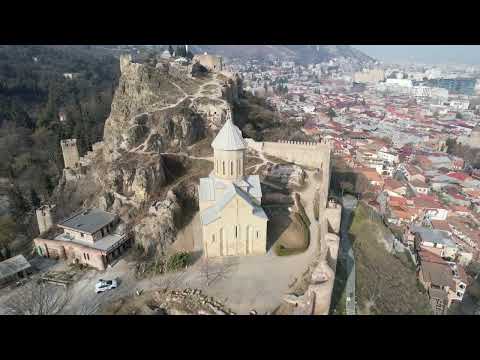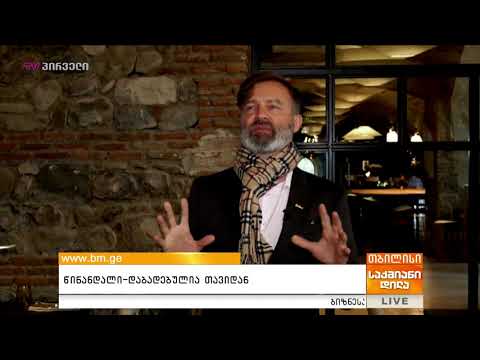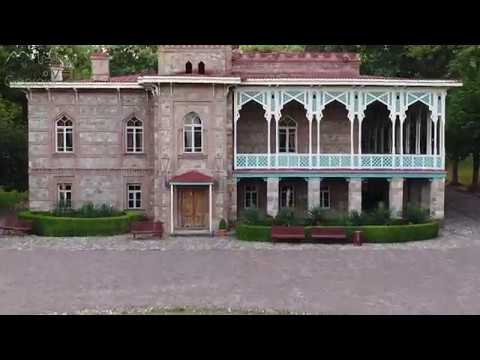წინანდალი / Tsinandali
Tsinandali museum complex - Alexander Chavchavadze House-Museum, beautiful garden of Tsinandali and the 19th century unique wine cellar. Located in the Kakheti region, Telavi municipality, village Tsinandali.
The Tsinandali Palace belonged to Garsevan Chavchavadze - Ambassador of Georgia in Russia during King Erekle II. The palace was inherited by his only son, Alexander Chavchavadze, the founder of Georgian romanticism, poet and public figure.
Chavchavadze Palace in Tsinandali was built in 1886 and is now is a House-Museum of Alexander Chavchavadze. There are preserved personal belongings of Chavchavadze family members. Various publications of the 19th century, manuscripts of the 18th century, photos of Dimitri Ermakov, paintings and lithographic patterns, Georgian, Russian and French furniture and various household items of the 18th and 19th centuries. Including: Chinese, Japanese, French, German, Italian, Georgian and Russian dishware with musical instruments.
The Tsinandali decorative garden is the first European type recreation zone in Georgia and the park covers 18 hectares. Alexander Chavchavadze brought European landscape architects to build it. It is unique with exotic varieties and planning. You will also meet exotic plants from China, America, Japan, Mediterranean Sea and other countries. There you will see the valley of love in Tsinandali garden. According to legend, if the couple are able to walk in this avenue with closed eyes, their love will be happy.
Wine storage of Tsinandali is located on the territory of the park and it is one of the first cellars in Georgia, which was built in 1835. That was the time when Georgian wine was bottled for the first time. Alexander Chavchavadze is the first person in Georgian history who bottled Georgian wine made in European style. In the Tsinandali cellar are preserved 16,500 bottles of wine bottled in various countries.
Tsinandali represented the land of Chavchavadze for centuries. Chavchavadze family moved to Kakheti in the eighteenth century. In his palace lived Garsevan Chavchavadze, who served the King Erekle II and was a plenipotentiary ambassador in Russia. There is little information about his palace today. It is known that the palace was located in the north-west of today's garden.
Garsevan Chavchavadze played an important role in the Russian-Georgian relations and signed the Treaty of Georgievsk with Ioane Bagration on 24 July 1783. King Erekle gave him a great lands from the mountain of Tsiv-Gombori to the southern slope of the Caucasus Mountains. The land of Tsinandali was inherited by his only son, the founder of Georgian romanticism, poet and public figure Alexander Chavchavadze (1786-1846).
Alexander Chavchavadze was born in St. Petersburg and was growing at the Imperial House. He was the godchild of Catherine II and Alexander I.
Alexander Chavchavadze had 4 children,14 grandchildren and 31 great-grandchildren. The eldest daughter Nino Chavchavadze was the wife of famous Russian diplomat and poet Alexander Griboedov. Second - Ekaterine Chavchavadze was the wife of David Dadiani, the last ruler of Samegrelo. The son, David became General Major at the Russian Imperial Military Service. His wife, Ana Bagrationi, was the granddaughter of the last King of Georgia, George XII. Youngest daughter of Alexander Sophie Chavchavadze married the head of the Caucasus School of Education Baron Aleksandr Nikolai.
In the XIX century the leading representatives of the Georgian society were gathering in Tsinandali. The palace also visited Russian and foreign diplomats and artists. The Tsinandali Palace was a cultural center of the XIX century.
Alexander Chavchavadze bottled Georgian wine made in European style for the first time in Georgian history. After he laid the foundation of wine made in European style.
In 1854, the Tsinandali lands were attacked by Shamils’ army. The palace was raided and burned down. David Chavchavadze family and relatives were captured, overall 24 persons. Shamil demanded the release of his son Jemal-ed-Din and a million rubles in exchange for the release of captives. As a result of the negotiations, the amount has been reduced to 40,000. Davit Chavchavadze mortgaged Tsinandali, Mukuzani and Napareuli for a family ransom.
In 1886, David Chavchavadze had to sell the Tsinandali land. After it moved to the ownership of the department of the prince land. From the same period, the great reconstruction of Tsinandali lands begins. The famous Russian architect, Aleksandre Ozerov, headed the reconstruction work. In 1887, the park was reconstructed by Swedish botanist Arnold Regele. Subsequently Chavchavadze land was transformed into Romanov summer residence.
After the sovietization of Georgia Romanov summer residence was transformed into a hotel; Since 1946, Alexander Chavchavadze House-Museum was opened by Georgian poet, Giorgi Leonidze.
#Tsinandali
#Telavi
#Kakheti
#Georgia
Lasha Mtvaradze-ის სხვა ვიდეოები
 00:58
00:58
ჯვრის მონასტერი / Jvari Monastery
 02:03
02:03
ნინო წმინდას შინი, ფოკა
 00:16
00:16
ნარიყალას წმინდა ნიკოლოზის ეკლესია / Church of St....
 02:06
02:06
ნარიყალას წმინდა ნიკოლოზის ეკლესია / Church of St....
 00:54
00:54
ნარიყალას წმინდა ნიკოლოზის ეკლესია / Church of St....
 00:46
00:46
ნარიყალას წმინდა ნიკოლოზის ეკლესია / Church of St....
 00:46
00:46
ნარიყალას წმინდა ნიკოლოზის ეკლესია / Church of St....

მსგავსი ვიდეოები

#25. Tsinandali Park - #25. წინანდლის პარკი
Soso Mikeladze Official

მუსიკა წინანდალში
Euronews Georgia

New Life of Tsinandali - წინანდალი დაბადებულია თავიდან
Radisson Collection Tsinandali

მუსიკალური დღეები წინანდალში
Euronews Georgia

წინანდლის დღიურები
Euronews Georgia

წინანდალი, კახეთი, საქართველო - 4K Tsinandali, Kakheti Georg...
Discover Georgia

მერაბ ვარდოსანიძე \u0026 ანსამბლი წინანდალი - ზამთარი Merab...
მერაბ ვარდოსანიძე

Discover Tsinandali Estate - აღმოაჩინე წინანდლის მამული
Tsinandali Festival